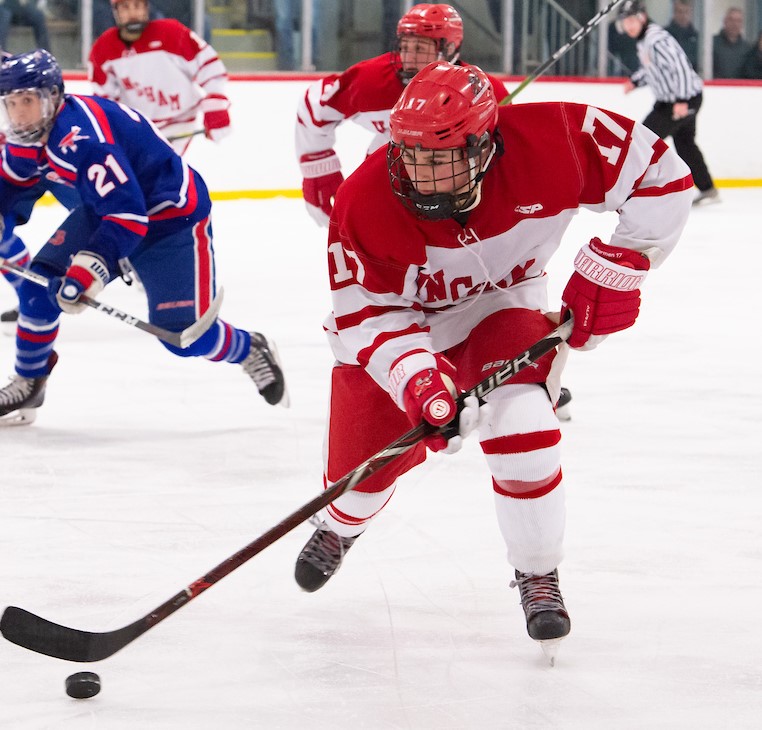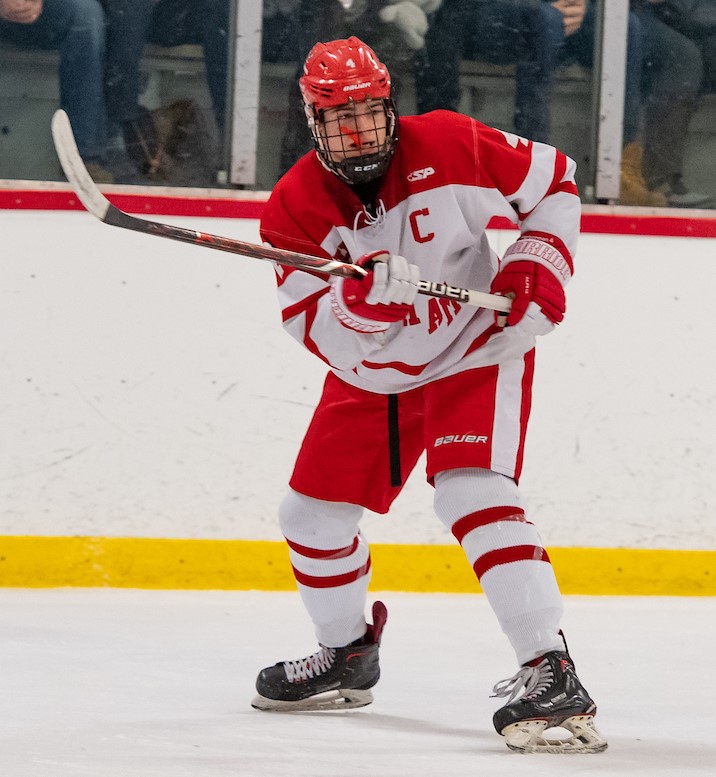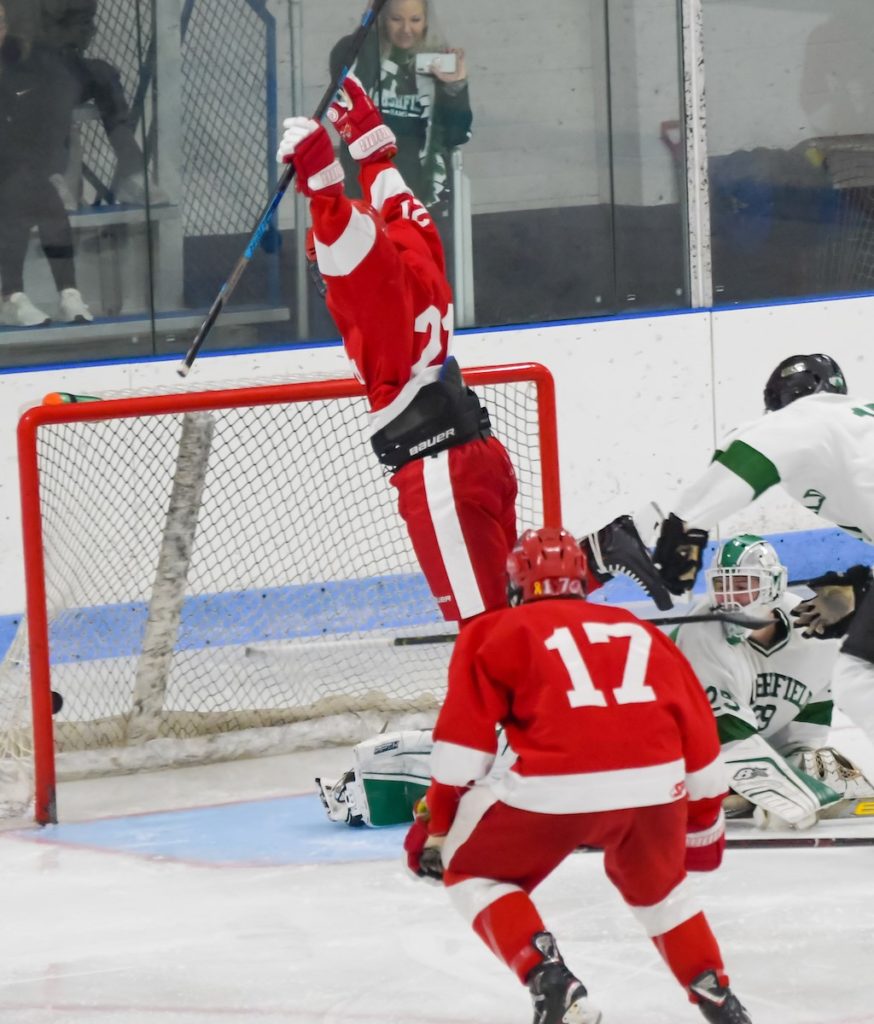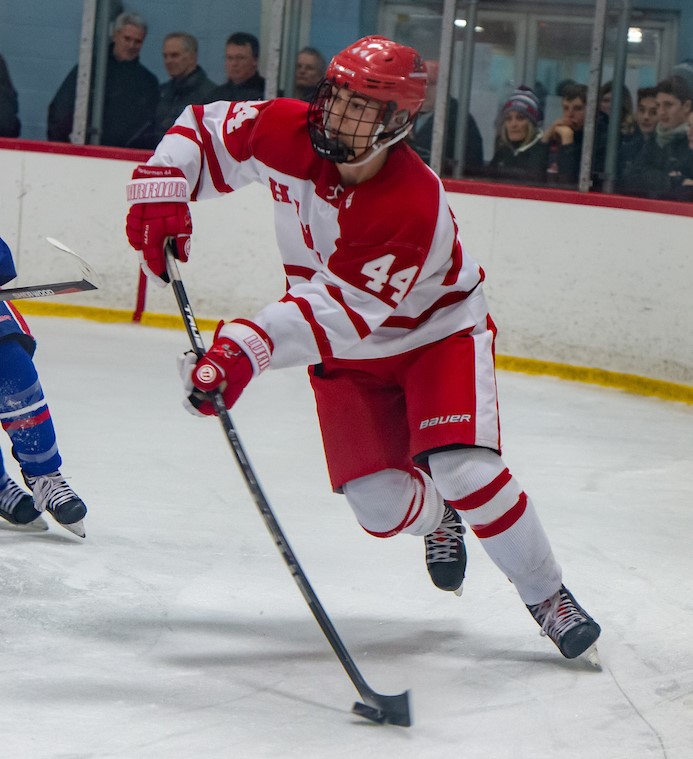
Building a tradition is generational: it’s a culture that is passed down annually from team to team, all based on the same system of belief. It’s also a hallmark of one of the first programs in Massachusetts public school hockey history, the Harbormen of Hingham High School.
Founded in the 1930s, Hingham HS initially played outdoors at the Hingham Skating Club against many of the top teams from the state and all across New England. The seeds were also sown for some of the South Shore’s best rivalries back in the 1950s with the creation of the South Shore HS Hockey League featuring Weymouth, Quincy, North Quincy, Archbishop Williams, Milton and Braintree. Over the last 85 years, Hingham HS has had a total of seven head coaches: all maintaining the continuity and tradition of the program with the local hunger to be the best team South of Boston.
Last week, we had the chance to interview 12-year head coach of the Harbormen Tony Messina. We spoke to him about the more recent history of the program: last year’s deep Super 8 run, the multi-sport athletes that call Hingham home and the tradition that the town has built over the last 85 years…

MassNZ: Last year was a great run in the Super 8, ending only a couple of games removed from the Championship game. What was the special element that last year’s team had?
Coach Tony Messina: We had a core of 14 seniors on last year’s team. Most of them had played on varsity and played in big games, like the Super 8. As a coach, that really helps us to prepare for each game. We had strong leadership amongst the seniors, the underclassmen were willing to be led and stepped up. We had good depth on forward and defense and Aaron Richardson, our goaltender, came through too.
NZ: How did those 14 seniors galvanize the squad throughout the playoffs and bolster the team’s belief?
Messina: We tend to have a lot of seniors each year, the top thing we ask of them is to be good teammates. Out of the 14 seniors we had, many of them contributed in big ways: there was a lot of good leadership, they not only made the hockey team strong, but they did the same thing for our school’s other sports. They were leaders in the high school, in the Hingham community, etc. They galvanized the team and the other players followed.
NZ: Many of your players are multi-sport athletes. Can you give a few examples of those players on last year’s team and how it helped make them better players on the ice? How do they balance multiple sports and still perform at a high level?
Messina: Lacrosse is the most common sport for our hockey players. Over the last two or three years, we’ve had great hockey players who are lacrosse commits as well. I never played the sport so I’m not sure the exact correlation but both sports include playmaking, developing skills with your hands, vision, strength, speed, all that stuff. Last year, senior forward Will Kenney was committed to Denison. Senior defenseman Jake Higgins was the lacrosse team captain and he committed to Holy Cross to play hockey. I think he could have played college lacrosse if he wanted to. Many of our players play baseball too.
The two sports don’t overlap seasons since lacrosse is in the spring. The day after the hockey season is over, the lacrosse season starts so there’s not a lot of time to transition. Training and development correlate to both sports I think. There’s a commitment that you need to be in the best shape you can. The commitment for both sports is six days a week so there is a strong commitment needed. Over the last couple of years Hingham lacrosse has been very competitive in the state: they won the state title in 2017.

NZ: Last year’s team was led by D1 commit Jake Higgins (a Mr. Hockey MassNZ finalist) and Will Kenney – what impact did both players have on the program which led to multiple Super 8 berths?
Messina: Both had strong impacts: Frankie Higgins (his older brother) was our team captain before Jake so he had a great role model to follow. Both Jake and Will were committed athletes who were totally devoted to our hockey program. They attended all voluntary stuff over their four years and led the group while also learning from the leaders who came before them. When times were tough our players looked to them for leadership: they were the guys that everybody wanted to be.
NZ: With so many players graduating, that must be a big challenge to rebuild on the fly – will you plan to move up multiple players from junior varsity and how will you prepare them for the challenge of varsity hockey?
Messina: Right now we have 90 players signed up for tryouts: there are a lot of guys looking to make the varsity team, especially some of the younger guys from our two junior varsity teams. There will be 15 seniors trying out, some of them were on the roster last year and didn’t get much ice time: those guys are chomping at the bit to contribute. We have lots of underclassmen who got good experience last year too. We may not have a ton of experience overall, but these guys have played a lot of hockey and are looking to get into the varsity games.
We know this year it will be a challenge to score goals and we lost a lot of experience defensively so the returning forwards and defensemen will have to help the younger guys. Our starting goalie graduated and we have four upperclassmen trying out – one will have to emerge. Some of our top returners we will rely on upfront include senior captain Joe Sullivan, senior captain Terrence Concannon, senior Tim Carroll and junior Paul Forbes. We also have senior captain Danny Packard anchoring our D which will be a big help.

NZ: Historically, Hingham has always been physically tough to play against and strong on the puck – how have you built that into the fabric of the program so that it endures season after season?
Messina: A lot of people have asked me that question before – I was the assistant coach here under Garrett Reagan, who coached at Hingham for 26 years. We built a culture which relies on a commitment to the team, hard work, and good character. I learned a lot over my 24 years as an assistant, and my now 12 years as head coach. Believe it or not, this will be the 85th year of Hingham HS hockey. We’ve had a lot of successful teams over the years. The history is something our players should be proud of. We always say that it is up to YOU as a player to maintain that level of success. This is how you will be remembered and why you need to work so hard. Seven of the nine coaches we have on staff are former Harbormen players. We all work together with that strong commitment – we were one of the first public high school teams in Massachusetts and we’ve only had seven coaches in the history of the program.
My coaches who have been here and played for Hingham understand that we are the caretakers of the program. It’s up to us to make sure that the players understand the team history and maintain the commitment we’ve built over many years: a self-fulfilling culture. The older guys teach the younger guys and those younger guys become older leaders – this is something we’re proud of.
NZ: Hingham has a rich tradition of athletes who came before the current students – how is the foundation they laid communicated to the current players?
Messina: There have been a lot of great players who’ve gone onto successful college careers at all levels coming from Hingham. Many of them come back to help out the program too. Every year at Christmas – the players who are playing in college come back to town and we invite them all back to skate with the team. Around Thanksgiving, we will have 75-80 of our recent grads playing in an alumni game here and the pace they play at is just great to watch.

NZ: Finally, what are your goals for this season for Hingham?
Messina: Well, we don’t start until the Monday after Thanksgiving but we’ll still have two weeks prior to our first game in order to get the young guys up to speed. We will be working on D zone coverage first, you can’t do anything at this level until you play D, that’s how you win. We also play one of the stronger schedules in the state so our guys need to be ready to go each and every night. The young guys have to be ready to compete. Early on we will focus on systems work and get that down first, it will take a while to find our identity.
